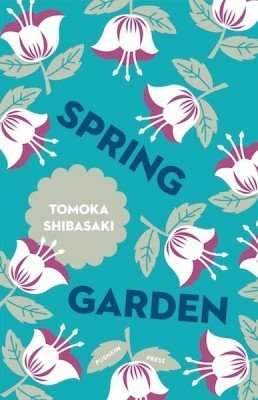SPRING GARDEN by Tomoka Shibasaki, Book Review
Spring Garden, winner of the Akutagawa Prize, is a sharp, photo-realistic novella of memory and thwarted hope.

Spring Garden Synopsis:
Divorced and cut off from his family, Taro lives alone in one of the few occupied apartments in his block, a block that is to be torn down as soon as the remaining tenants leave. Since the death of his father, Taro keeps to himself, but is soon drawn into an unusual relationship with the woman upstairs, Nishi, as she passes on the strange tale of the sky-blue house next door.
First discovered by Nishi in the little-known photo-book ‘Spring Garden’, the sky-blue house soon becomes a focus for both Nishi and Taro: of what is lost, of what has been destroyed, and of what hope may yet lie in the future for both of them, if only they can seize it.
Translated from the original Japanese (‘Haru No Niwa’) by Polly Barton
(Pushkin Press, 2017)
Disclosure: If you click a link in this post we may earn a small commission to help offset our running costs.
Sign up to our Booklover Book Reviews emails and receive our gift for new subscribers. LEARN MORE >>
BOOK REVIEW
After reading several gritty crime thrillers recently I was looking for a change of pace – Tomoka Shibasaki’s short novel Spring Garden certainly delivered on that.
Like much of the Japanese literature I have read Shibasaki’s narrative explores themes of loneliness and alienation, a consciousness of the passing of time and ascribing meaning to the mundane or common place.
… he peered around the cups and glasses on the third shelf to be sure that the mortar and pestle was still there. He’d bought it in a houseware store two days after his father died. He’d come to realize that it was a mistake to grind up his father’s remains with such a thing. The mortar was lined with narrow grooves, a little too perfect for ashes to get stuck in. Taro was loath to rinse them away, though, so to this day those little furrows, like scratches made with a comb, still had some fine white powder in them.
In a similar vein to Hiromi Kawakami’s The Nakano Thrift Shop, the narrative viewpoint in Spring Garden is at times beguiling in its candour and contradictions – one of isolation or detachment within a crowd, but at the same time an acute awareness of and curiosity for the smallest details.
Avoiding bother was Taro’s governing principle. It wasn’t that he was a stick-in-the-mud. It was just that, rather than putting himself out in order to get the more pleasing or interesting things he stood to gain, he always opted for the least bothersome option. Bother still seemed to find its way into his life, however.
Passivity and obsession
In this work though, the passivity of Taro and obsessive nature of Nishi are overt, and it is these macro behaviours along with the intersection of art, nature and architecture, where this story lies. The latter I really enjoyed.
Nishi had never had a pet of any kind, and the fact that there were living things that had no connection to her, inhabiting the same space as her, seemed wondrous.
Another characteristic common to Japanese literature that I find appealing is the subtlety and restraint of plot and prose — its quietude. If approached in the right state of mind it can offer a soothing, almost dreamlike reading experience.
In Spring Garden Shibasaki (and in turn translator Polly Barton) employs simple, clarified prose, and despite an absence of momentum, in the main I found the reading experience calming. There were however times the narrative tangent felt wayward. While subtle tension/expectation is built in the reader’s mind, several story tangents are ultimately left unrealised.
And the twist in narrative at this novel’s conclusion…. whether I have fully appreciated its meaning is something I am left to ponder.
BOOK RATING: The Story 3 / 5 ; The Writing 4 / 5
Get your copy of Spring Garden from:
Book Depository | Amazon | Kobo | Booktopia | B&N | Scribd (Free 1 Month Trial)
Genre: Literature, Mystery, Translation
About the Author, Tomoka Shibasaki
Tomoka Shibasaki was born in 1973 in Osaka and began writing fiction while still in high school. After graduating from university, she took an office job but continued writing, and was shortlisted for the Bungei Prize in 1998. Her first book, A Day on the Planet, was turned into a hit movie, and Spring Garden won the prestigious Akutagawa Prize in 2014.
About the Translator, Polly Barton
Polly Barton is a translator of Japanese literature and nonfiction. Born in London, she studied philosophy before traveling to Japan, and now lives and works in Osaka. She holds a MA in the Theory and Practice of Translation from SOAS, University of London, and was awarded first prize in the inaugural JLPP Translation Competition for her translations of Natsuki Ikezawa and Kobo Abe. Recent and forthcoming translations include short stories by Aoko Matsuda and Naocola Yamazaki, a novel by Sawako Ariyoshi, and various nonfiction projects.
Other reviews of Spring Garden
Goodreads, Tony’s Reading List, JapanTimes, BookBag, CompleteReview
